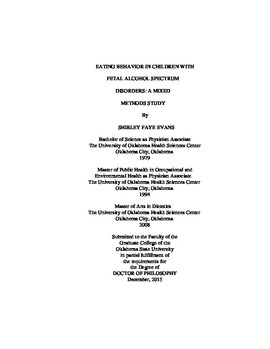| dc.description.abstract | Secondary to associated physical defects, global behavioral problems, and co-occurring diagnoses, studies suggest there are problems with nutrition and eating in children with fetal alcohol spectrum disorders (FASDs); however, there is limited research on the effects of prenatal alcohol exposure on childhood eating behavior. A mixed methods approach was used to define the eating behavior in children with FASDs, aged 3 to 5 years, through responses from caregivers of children with FASDs to the Children's Eating Behavior Questionnaire and the Child Behavior Checklist 1.5-5, and through focus groups of healthcare professionals with FASD pediatric experience. There were 74 caregivers and 26 healthcare professionals from across the U.S. and internationally who participated in the study. When compared to a normative sample, the findings from caregiver responses demonstrated atypical eating behavior in preschool-aged children with FASDs characterized by maladaptive appetites, selective eating, slowness in eating, and an excessive need for drinks. In relation to global behavioral problems, it was found that the children with FASDs ate faster if taking a greater number of medications, but slower with somatic symptoms. During stress, caregivers reported the children with FASDs, who exhibited internalizing behaviors, under ate, while those with externalizing behaviors overate. In addition, the children with FASDs, who had both internalizing behaviors and sleep problems, experienced more food fussiness. The healthcare professionals identified atypical eating behavior in the children with FASDs that was influenced by co-occurring diagnoses with or without medications, food hypo- or hypersensitivities, food intolerances, late FASD diagnosis, and nutritional deficiencies. Furthermore, healthcare professionals expressed that the atypical eating behavior in the preschool-aged children with FASDs was impacted by family stress, the limited nutrition knowledge of the children's caregivers, and a need for improved caregiver feeding practices. Findings suggest that the severity of the FASD condition may underlie the children's atypical eating behaviors in association with higher levels of behavioral problems, medications, and stress in the family. With the identification and characterization of atypical eating behavior in preschool-aged children with FASDs, targeted nutrition education and interventions can be developed in an effort to improve nutrition, childhood development, and quality of family life. | |
